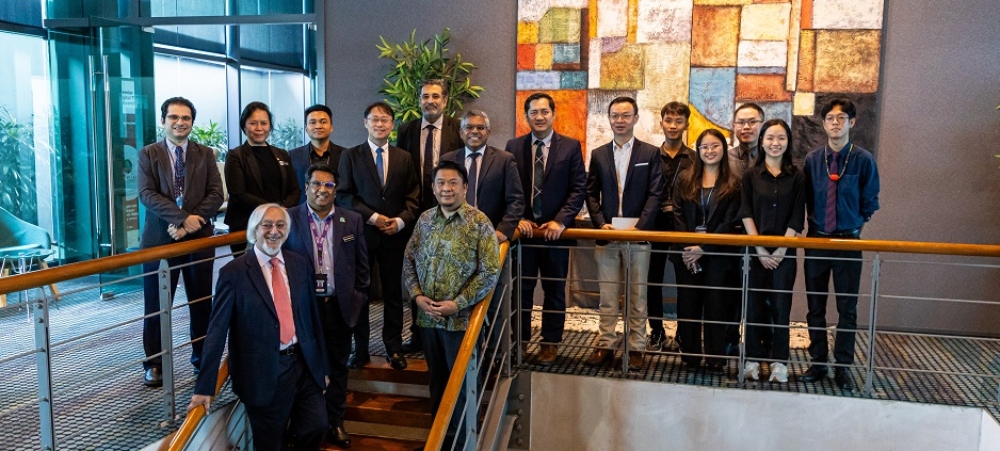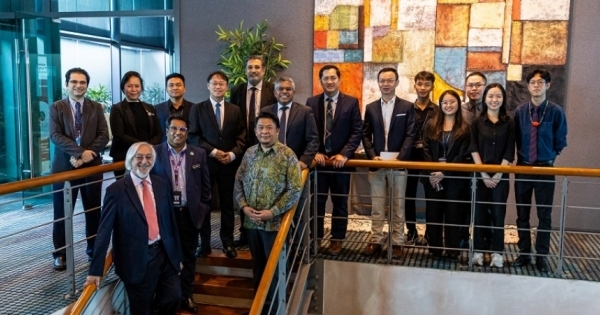- Visit affirms APU’s role as a top digital tech institution and key healthcare innovation partner
- Minister discussed MOH’s plans to regulate AI in healthcare to support, not override, clinical decisions

The Asia Pacific University of Technology & Innovation (APU) recently hosted a visit from deputy health minister, Lukanisman Awang Sauni, on 30 June 2025. This followed the Ministry of Health Malaysia (MOH)’s appointment of APU as one of its official consultants to the Health Performance Unit (HPU) on 26 May 2025.
Accompanied by Dr Saravanan S.R. Sundaramurthy, director of the HPU, and senior MOH officers, the Deputy Minister engaged with APU’s senior leadership team, led by CEO Parmjit Singh. The visit included a tour of the university’s high-tech labs, reinforcing APU’s role as a premier digital tech institution and strategic partner in national healthcare innovation.
During the session, Lukanisman highlighted Malaysia’s healthcare transformation, driven by digital innovation, strategic planning, and firm policy direction. He noted the MOH’s work towards a national electronic medical record system, prioritising cybersecurity and data privacy. Addressing public trust concerns seen in countries such as Singapore and Australia, he stressed the need for transparent data governance.
He also discussed the MOH’s exploration of legislation to regulate AI in healthcare, ensuring it supports clinical decisions without overriding medical autonomy. He further elaborated on the ministry’s digital health division, which is now tasked with not only software and hardware development but also shaping policies for telemedicine, medical devices, and digital standards.
Expressing optimism about collaborations with private universities, Lukanisman emphasised the importance of upskilling healthcare professionals and expanding postgraduate pathways. “Our future-ready system must be built on strong academic and industry partnerships,” he said.
Leading APU’s consultancy efforts with the HPU is Prof Ir Eur Ing Dr Vinesh Thiruchelvam, chief enterprise & innovation officer, supported by Dr Julia Juremi, head of the Forensics and Cyber Security Research Centre (FSeC), and Hema Latha Krishna Nair, head of the Asia Pacific Centre for Analytics (APCA).
Prof Vinesh presented APU’s ten-year development framework aligning healthcare innovation and talent development with national economic drivers. “We are engaging undergraduate students in real-world, impact-driven innovation,” he said. He also shared plans to co-develop entrepreneurs within the MOH, transforming innovation into commercial products.
One such initiative is the Asia Pacific Centre for Robotic Engineering (APCoRE), which pioneers biomedical robotics such as brain-computer interfaces, VR rehabilitation, soft robotic aids, and TremorX systems for Parkinson’s patients.
Hema Latha’s team at APCA is advancing clinical decision-making through predictive and prescriptive analytics, including disease forecasting and treatment rescheduling. APU also conducts epidemiological studies using global datasets, focusing on type 2 diabetes, dengue, and nasopharyngeal carcinoma.
Further projects include AI and machine learning collaborations on ventilator maintenance with Advanced Pact, and XR technologies led by Dr Siti Azreena for immersive medical training and mental health awareness. Meanwhile, Ir Narendran Ramasenderan, director of APU’s Centre for IoT and Drones, is developing automated hospital transport systems, medical drones, and AI-powered disease detection tools.
In his closing remarks, Parmjit stressed the importance of cultivating future-ready talent and bridging the gap between research and industry. “Talent is the cornerstone of economic progress,” he said. Responding to concerns about skilled talent emigration, he noted that APU’s model of ‘overproducing’ qualified graduates helps counteract brain drain, with many alumni contributing globally.
He added that a significant portion of APU’s academic staff comprises former industry professionals, ensuring curricula remain practical and relevant. APU’s strong culture of entrepreneurship is further supported by strategic partnerships and a vibrant alumni network.
During the visit, Lukanisman, MP for Sibuti, Sarawak, also met four Sarawakian students: Ryan Goh Shun Jie, Chong Ri Rong, Ria Annice Jara Sunting, and Annabel Yu Li Yin. Expressing pride in their academic pursuits, he said, “It is encouraging to see Sarawakian students in fields that will support the state’s digital economic transformation,” and briefed them on benefits and opportunities offered by the Sarawak state government.
The visit concluded with a tour of APU’s facilities including the Cybersecurity Talent Zone, FSeC, APCA, XR Studio, and APCoR, followed by a token presentation and group photo session. It marked the beginning of a promising long-term collaboration between the MOH and APU in advancing Malaysia’s healthcare and digital innovation landscape.
(Except for the headline, this story has not been edited by PostX News and is published from a syndicated feed.)

